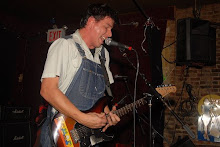
Toscanini: "I conducted that? I must have been crazy!"
When the going gets wierd the wierd turn pro,
or,
how to keep people's hope alive while not forgetting
how messed up things are and need change;
And that the last time we successfully exited a Depression, it included this.
Dmitry Shostakovich
Opus 60, Symphony No. 7, "Leningrad"
Arturo Toscanini, conductor
NBC Symphony Orchestra, augmented with
15 additional musicians
July 19, 1942
Studio 8-H
NBC Radio City Studios
New York City, NY
Western Premiere performance broadcast, includes extensive interviews and announcements which were given before and immediately after the event.
This recording places most of the elements together which make Shostakovich's Symphony 7 such a cultural touchstone of our human race.
I hope it is enough to relive the event through these mp3s to avoid having to invoke starvation and industrialized murder for such a response.
It is the broadcast of the first time it was played in the West, after unyielding hope and unity made the initial performances in the destroyed halls of the Soviet Union such reaffirmations of life. Dmitry Shostakovich wrote it in between the days spent working as a fire warden, watching his city receive destruction.
The heightened emotional pitch of the times- mid World War - is easily felt though this document. Although the work itself has since undergone critical downgrading (as if!), that sort of thinking missed the point; its relevance as "...music about terror, slavery, and oppression of the spirit..." will continue indefinitely.
The composer also mused about it in terms of questioning, which Leningrad does it refer to?Apparently it is not just about the city under Hitler's physical attack but also the city he remembers as it was before the destructive rule of his government, before Stalin's political empowerment.
As Robert Nylund remembers, this was broadcast live on NBC,"... only to have the radio signals on the New York station nearly obliterated by a severe thunderstorm. Fortunately, the storm did not interfere with the recording that was finally issued by RCA Victor in 1967..."
A good sense of what this is about is from Michael Jones' book, "Leningrad: A State Of Siege", where he tells that it was not just armies that liberated the city finally, but "...how the people of Leningrad found the resources within themselves to endure and to survive...The greatest symbol of this defiance was an extraordinary orchestral concert. On 9 August 1942 the besieged city put on a performance of Shostakovich's Seventh Symphony....The symbolic importance of this concert was enormous...The Germans had boasted that they would capture the city on 9 August and hold a victory celebration at Leningrad's Astoria Hotel. The date for the Seventh Symphony's premiere was thus deliberately chosen...Many years after the war [the conductor] was approached by a group of German tourists, who said that they had come to the city especially to see him. They had been in the besieging army outside the city, so close that they were able to intercept Leningrad's radio signals, and hear the broadcast of Shostakovich's Seventh. Now these veterans said: "It had a slow but powerful effect on us. The realisation began to dawn that we would never take Leningrad."...



























7 comments:
http://www.mediafire.com/?dhnlhiesebg
Gracias Guillermo
descubri hace poco su excelente blog, y permitame felicitarlo.
Gracias!
Enrique.
Hi
Thanks very much for this. Much appreciated!
odysseus
Wow, just found this and would love to hear it... but unfortunately the link is dead.
Oops. I'll Get This Restored Shortly
Ok. So, the awesome folk over at The Music Parlour have put up a latest version, meaning somewhat improved sound:
http://musicparlourhistorical.blogspot.co.uk/2014/02/arturo-toscanini-nbc-so-shostakovich.html
Plus, I love that blog.
Yes! Thank you for pointing me there. Can't wait to hear this!
Post a Comment